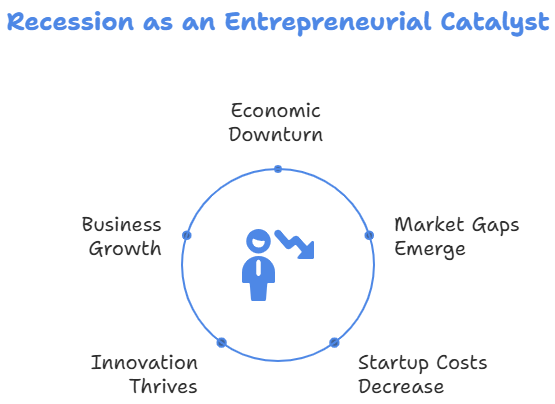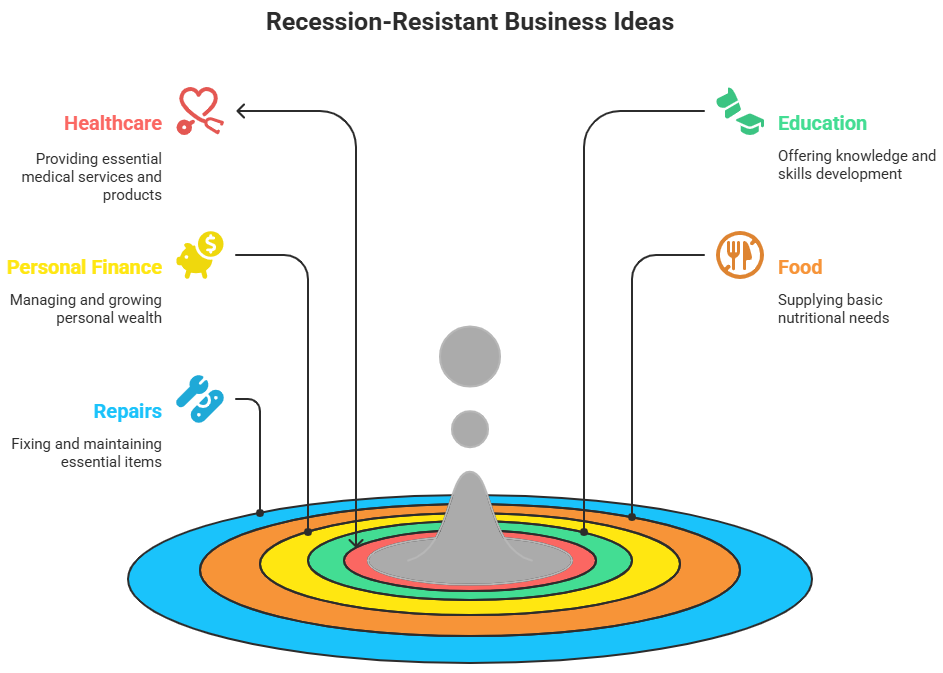Starting a business in a recession isn’t crazy, it’s smart. Discover recession-proof startup ideas and test them risk-free with Startup Wars.
Table of Contents
Is a Recession Coming? Here’s Why It Might Be Your Best Opportunity Yet
Everyone’s buzzing: inflation’s up, layoffs are hitting, interest rates are high, and yeah, a recession might be knocking. But here’s a curveball: this could actually be the best time to start your business.

Why the 2026 Economic Downturn Could Be a Turning Point for Entrepreneurs
It’s not just theory, it’s history. Some of today’s biggest names (Airbnb, Uber, Slack) were born during economic downturns. Why? Because tough times spotlight real problems. If you’ve got an idea that solves one? You’re ahead of the curve.
The Chief Economist at TD, defines a recession as a “significant decline in economic activity” over a few months. Sure, that sounds serious, but it also means market gaps, less noise, and lower startup costs.
What History Tells Us About Recession and Opportunity
Here’s a stat for you: 63% of Fortune 500 companies were founded during recessions or bear markets (source: Ewing Marion Kauffman Foundation). And after COVID hit in 2020? Boom, record-breaking numbers of new small businesses launched.
Inflation and Recession: How They’re Connected to Innovation
Inflation leads to higher rates. That cools spending and slows the economy. But guess what thrives? Affordable, practical, problem-solving startups. And that might be where your idea fits perfectly.
So, yes, a recession may be on the way. But maybe… just maybe, that’s your green light.
How to Survive a Recession in 2026: Turn It into Your Startup Launchpad
Look, nobody loves the “R” word. Recession? It’s a stress trigger. But for entrepreneurs, it can also be a signal: now’s your moment. Sounds wild? Stay with us.
From Layoff to Launch: Start a Business in a Recession

If you’ve been laid off, you’re not alone. 2023 saw waves of job cuts across tech, retail, and beyond. But here’s the flip side: 5.5 million new business applications were filed that same year, one of the highest on record. Yep, that’s real.
When stability goes out the window, creativity kicks in. People stop chasing fancy, and start paying attention to what really matters. And that’s where your business idea could shine. Think:
- Home repairs? Needed.
- Online education? Booming.
- Discount eCommerce? Rising.
- Elder care? In demand.
All of these are examples of recession-proof businesses, low-cost, essential, and steady even when the economy’s shaky or if you’re just laid-off.
What You Can Learn About Startup Ideas and Resilience
A good recession startup doesn’t need to be flashy. It needs to solve a problem, fill a gap, or just do something better. Ask yourself:
- What are people still spending on?
- What problem do I get asked to help with?
- What can I start lean?
Recession-resistant businesses tend to stick to the basics, healthcare, education, personal finance, food, repairs. According to Investopedia, these industries weather downturns well because they’re needs, not wants.
And remember, resilience isn’t just about your product. It’s about you. Being willing to build something small. Test it. Tweak it. Grow it over time.

Recession Isn’t the End, It’s the Catalyst
Let’s flip the narrative. Recessions aren’t just cutbacks and chaos, they’re permission to pivot.
If you’re reading this while feeling stuck, unemployed, or burned out, take it as your sign. That idea you’ve been sitting on? The one scribbled in your notes app? Now’s the time to test it.
Not sure where to start? You don’t need to go all in right away. Startup Wars gives you a way to simulate a real startup, from costs and marketing to operations and customer feedback. It’s hands-on, safe, and designed for first-timers who are serious about building, not just dreaming.
Try your idea without the risk. No pitch deck required.
What Makes a Business Recession-Proof? (And How to Assess Your Opportunities Before Starting a Business)
Before jumping into the startup scene, you’ve gotta ask: Is this idea recession-proof or a financial faceplant waiting to happen? Let’s break down what makes a business built to ride out economic storms, and how you can spot a solid opportunity before risking your cash.
Key Traits of Recession Resistant Businesses
Some industries just don’t flinch when the economy tanks. Recession resistant businesses tend to check a few important boxes:
- Essential services: Think healthcare, auto repair, home maintenance, stuff people can’t put off when things get tight.
- Low overhead, high demand: Businesses with minimal fixed costs but consistent need (like cleaning services or tutoring) can thrive even in an economic downturn.
Repeat customers: Subscription models, essentials, or habit-based buys (like grocery or personal care) offer steady cash flow.
How to Assess Your Opportunities Before Starting a Business in a Recession

If you’re exploring startup ideas in 2026, here’s a simple filter to apply:
- Ask: Is this product/service essential? (i.e., would people still pay for it if budgets were tight?)
- Run a competitor check: Are recession-proof brands already succeeding in this space?
- Test before you build: Use tools like Startup Wars to simulate your idea and spot issues early.
- Check your costs: Is this business idea something you can start lean, no big equipment or full-time team needed?
Stat time: In 2023, 56% of Americans said they were unprepared financially for a recession, which means your startup has a real shot if it helps people save, stay stable, or earn extra income.
Why Some Industries Are Built for Recessions
Let’s get real, some industries just work when the economy doesn’t:
- Consumer staples: Food, toiletries, cleaning products. People still gotta eat and stay clean.
- Healthcare: From mental health to elder care, demand rarely drops.
- Education & reskilling: People use recessions to level up, online courses and coaching see big spikes.
- Home services: Plumbers, contractors, and auto techs are always needed, especially when folks stop replacing and start repairing.
💡 Pro Tip: Recession proof industries are more than survival tools, they’re growth engines. Startup founders who learn how to position their business to meet real, unavoidable needs are way more likely to succeed, pandemic, inflation, or not.
5 Recession-Proof Businesses to Start in 2026 (And How to Test These Startup Ideas)
Not all businesses ride out a storm, but some dance in the rain. Whether you’re thinking of a career switch or eyeing your first side hustle, these five recession-resistant businesses are built to hold steady when the economy gets shaky.
🛠️Home Services & Auto Repair – High Demand During Recessions
People might skip new gadgets, but they won’t skip fixing a broken water heater or their car’s brakes. Plumbing, HVAC, appliance repair, they fall under “essential spending.” Low overhead, local reach, and consistent demand = recession proof.
🎓Online Education & Coaching – Remote and Scalable
When jobs get shaky, people go back to school (or YouTube University). Offer online coaching or create a digital course to help others upskill, it’s scalable, low-cost, and can be tested fast using Startup Wars’ simulation tools.
💻Technology Stocks – A Resilient Investment Sector to Watch
While risky, technology stocks have shown bounce-back potential. If you’re launching a business in SaaS, cybersecurity, or remote work tools, you’re not just surviving, you’re riding a digital wave. Explore how a Mobile App Simulation can help you build this business.
🏥Healthcare & Elder Care Services – Aging Population, Stable Demand
People don’t stop getting sick, or aging. Launching a healthcare-adjacent service (mobile care, remote monitoring, caregiver support) means you’re serving a non-negotiable human need.
🛒 Discount & Essentials eCommerce – Sell What People Still Need
From consumer staples like soap and paper towels to affordable home goods, people always need the basics. Recession or not, eCommerce platforms that focus on affordability see continued traction. Look at the rise of dollar stores, Aldi, and budget-focused online retailers.
✅ Pro Tip: Before you invest real money, simulate your business idea in Startup Wars. You’ll stress test your plan, refine your strategy, and avoid costly mistakes, all from the safety of your screen.
Recession-Proof Your Future
Starting a business during a recession isn’t reckless, it’s smart, if you prepare wisely.
The most successful founders don’t rely on luck. They assess opportunities like pros: they define the problem they’re solving, check if people actually want it, run the numbers, and plan for what could go wrong. (Yes, even before spending a dime.)
Startup Wars lets you simulate the startup journey without the financial risk. You can validate your business idea, stress-test your assumptions, and practice smart decision-making, all inside a hands-on, gamified environment designed to make learning fun, not scary.
Why guess when you can simulate?
Frequently Asked Questions
1. ❓What is a recession-proof business?
2. ❓How do I start a recession-proof business with little money?
3. ❓Why is a recession a good time to start a business?
4. ❓What are the benefits of starting a business during a recession?
5. ❓How can I assess if my startup idea is recession-proof?
Ready to Build Real-World Business Skills?
People Also Searched For:
-
The Real Reasons Startups Fail - What 2 Startups & 70+ Startup Investments Teach You About Success
-
Most Founders Build Too Fast and That’s Why Startups Fail
-
ChatGPT 5 Release: What Educators and Students Should Know
-
Case Study in Education vs Simulation: Which Is Better for Teaching Entrepreneurship?
-
How to Use Business Simulations in the Classroom



